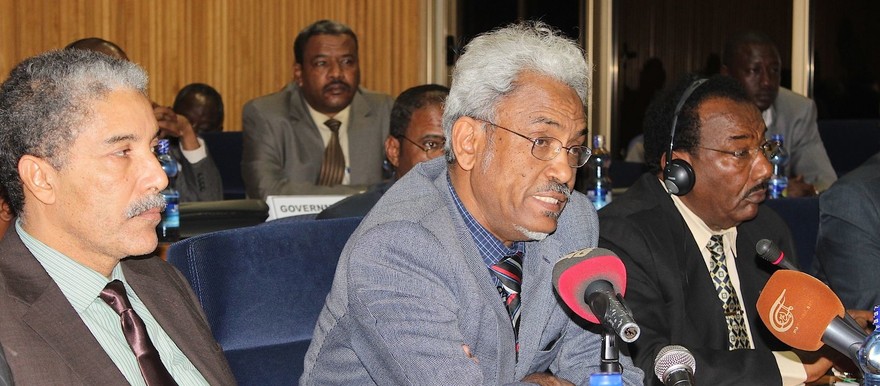Photos: Darfur talks open in Addis Ababa

Representatives of two Darfur armed movements and the Sudanese government attended the opening of session of ceasefire talks held under the auspices of the African Union in Addis Ababa, Ethiopia on Sunday.
Thabo Mbeki, former president of South Africa and head of the mediation team known as the African Union High-Level Implementation Panel (AUHIP) addressed the participants at the opening session.
He said the ceasefire talks are linked to an effort to involve the Darfur armed movements in the National Dialogue process initiated by Sudan’s President Omar al Bashir earlier this year. He said the African Union Panel is “very excited about that.”
Mbeki referred to the need for a ‘holistic solution’ to Sudan’s problems, explaining that the ceasefire would lead to more conducive conditions for the political process.
“In that context it’s important that everything should be done basically to end all of these violent conflicts around the country – in the ‘Two Areas’ in Blue Nile and South Kordofan, and in Darfur – to ensure that indeed you create this situation of peace throughout the country to facilitate that National Dialogue including the participation of everybody involved in that conflict,” said Mbeki.
Minni Minawi, head of a faction of the Sudan Liberation Army (SLA), said a cessation of hostilities agreement would be a good way start to any negotiations process, but cautioned, “It is our position that this matter cannot stand as isolated process by itself but it is part and parcel of the other political issues.”
He referred to a “three-track process” that he should be harmonized: the ongoing SPLA-N talks, the Darfur talks, and the National Dialogue talks. Earlier this month Minawi participated in the SPLM-N talks, which have adjourned temporarily.
For his part, Jibreel Ibrahim, chairman of the Justice and Equality Movement (JEM), stressed that his movement is not representing only Darfur regional interests: “Our members our based throughout all the regions of our land. As a coalition the problem we seek to address is singular: how best shall Sudan be ruled?”
“Of course, by talking about a nationwide solution, we do not propose that conflicts of war-affected regions do not present regional particularities that require specialized handling,” said Jibreel.
“We are here to engage in negotiations that encompass comprehensive regional and national issues,” he said. “We don’t go for partial peace deals – we don’t see any fruits that may come from partial peace agreements.”
He was referring implicitly to the earlier Abuja and Doha agreements with Darfur rebel groups SLA-MM and LJM, respectively.
Khartoum’s representative used different language, narrowing his focus primarily to Darfur and not mentioning national governance questions. He also voiced support for the existing Doha agreement for peace in Darfur.
Amin Hassan Omar, speaking on behalf of the Sudanese government, referred repeatedly to “a comprehensive peace in Darfur” and calling for “faithfully implementing the DDPD [Doha Document].”
“I call up on the two movements present today in this forum [JEM and SLA-MM] to respond positively to the repeated calls of the [African Union] PSC and the UN Security Council to subscribe to the DDPD [Doha Document for Peace in Darfur.”
“And to engage in a faithful negotiation leading to an agreement on a comprehensive ceasefire that will facilitate their participation on the National Dialogue and thereafter to continue negotiating political issues pertaining to their accommodation in the political process and the final security arrangements.”
JEM and SLA-MM are part of an umbrella coalition called the Sudan Revolutionary Front, which controls territory not only in Darfur but also the Two Areas. Previously the Front has explicitly demanded the toppling of Sudan’s ruling party.